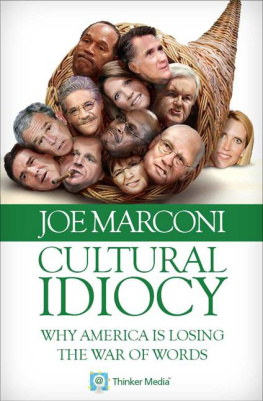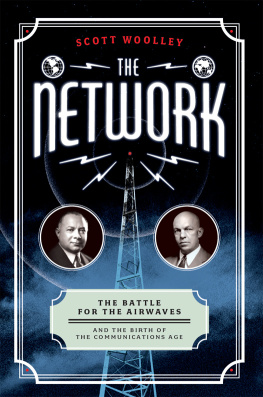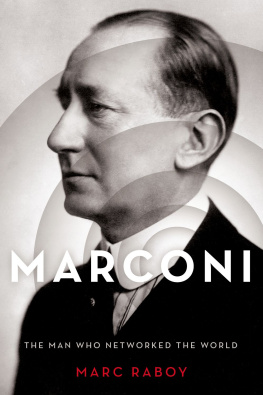Joe Marconi - Cultural Idiocy:Why America Is Losing the War of Words
Here you can read online Joe Marconi - Cultural Idiocy:Why America Is Losing the War of Words full text of the book (entire story) in english for free. Download pdf and epub, get meaning, cover and reviews about this ebook. year: 2012, publisher: Thinker Media, Inc., genre: Politics. Description of the work, (preface) as well as reviews are available. Best literature library LitArk.com created for fans of good reading and offers a wide selection of genres:
Romance novel
Science fiction
Adventure
Detective
Science
History
Home and family
Prose
Art
Politics
Computer
Non-fiction
Religion
Business
Children
Humor
Choose a favorite category and find really read worthwhile books. Enjoy immersion in the world of imagination, feel the emotions of the characters or learn something new for yourself, make an fascinating discovery.
- Book:Cultural Idiocy:Why America Is Losing the War of Words
- Author:
- Publisher:Thinker Media, Inc.
- Genre:
- Year:2012
- Rating:4 / 5
- Favourites:Add to favourites
- Your mark:
- 80
- 1
- 2
- 3
- 4
- 5
Cultural Idiocy:Why America Is Losing the War of Words: summary, description and annotation
We offer to read an annotation, description, summary or preface (depends on what the author of the book "Cultural Idiocy:Why America Is Losing the War of Words" wrote himself). If you haven't found the necessary information about the book — write in the comments, we will try to find it.
Joe Marconi: author's other books
Who wrote Cultural Idiocy:Why America Is Losing the War of Words? Find out the surname, the name of the author of the book and a list of all author's works by series.
Cultural Idiocy:Why America Is Losing the War of Words — read online for free the complete book (whole text) full work
Below is the text of the book, divided by pages. System saving the place of the last page read, allows you to conveniently read the book "Cultural Idiocy:Why America Is Losing the War of Words" online for free, without having to search again every time where you left off. Put a bookmark, and you can go to the page where you finished reading at any time.
Font size:
Interval:
Bookmark:
"There are only two truly infinite things, the universe and stupidity. And I am unsure about the universe."
That's one of those quotes endlessly repeated on the Internet, where it is credited to Albert Einstein, who may or may not have said something like it. The statement doesn't seem to have shown up in print until almost three decades after Einstein died, in a book of humorous quotes. Maybe Internet quotations should have their own subheading under the Cultural Idiocy label, but that's beside the point. I only include the observation because its ubiquity on the Web illustrates that: (1) Stupidity is rampant in American society and it is becoming more widespread, and (2) I'm not the only one who noticed.
On a lovely July day in 2011, the Internet search engine Yahoo! listed 60,500,000 results for the words "really stupid things" (in quotes). The more popular Google showed "about 3,870,000." That's quite a disparity, which could be a reflection of the lack of a unified standard or a difference of opinion, or of editors just making up numbers in the belief that no one's ever going to check. Some people might suggest that both numbers are much too low. Countless volumes chronicle blunders, absurdities, words, and deeds that most dictionaries would define as "inconsistent with obvious truth, reason, or sound judgment." Pretty much everyone has personal knowledge, based on observation, of the stupidity of others.
But here's where it gets tricky. According to a Nobel Prize-winning psychology study, stupid people do not know they are stupid. In 1999, David Dunning and Justin Kruger, researchers at Cornell University, published a report called "Unskilled and Unaware of It: How Difficulties in Recognizing One's Own Incompetence Lead to Inflated Self-Assessments."
"Sure there have been injuries and deaths in boxing, but none of them serious."
Alan Minter, prize fighter
So, if that's the case, do we hold every transgressor responsible for every stupid comment and/or act of idiocy? Is characterizing someone's bad grammar or poor communication skills or strongand arguably disagreeableopinions as "cultural idiocy" unjustified or elitist? Does it amount to taking a cheap shot at someone who holds opposing views? The only proper answer to this question isthat depends. It depends on whether or not a case can be made to support such a characterization. Is it cultural idiocy or just plain incompetence? "Cultural" is defined as relating to the arts and manners favored by a particular group. That would include standards of behavior and the art of communication. "Idiocy" means extreme stupidity (stupid being a poor ability to understand or profit from experience). And as Forrest Gump's mama put it, "Stupid is as stupid does."
It seems only fair to say that the "innocent"the person who commits a faux pas, unwittingly drops a malapropism in public or unintentionally misspeaksmight be given a pass, albeit not without a deep sigh and a headshake of disapproval. But when an intelligent personsomeone who is supposed to know better and, even if he or she doesn't know better, has an army of slick advisers and handlerssays or does something idiotic with malice aforethought, as lawyers like to say, and because, under prevailing cultural standards, he or she thinks there's a good chance of getting away with it, should that person, at the very least, not be made to stand in the corner or be listed on some type of Hall of Shame plaque? Or be forced to watch Howie Mandell on television for a minimum of four hours?
What could fairly and accurately be called "word games" play a big part in shaping public sentiment. Remember the title of Newt Gingrich's 1990 pamphlet, "Language, a Key Mechanism of Control." In the interest of manipulation, self-appointed opinion shapers throw around words and phrases that sound like they mean something important, although often they mean little to nothing. Some people the cantankerous radio announcer Rush Limbaugh, for exampleinsist that elected leaders should have not just basic skills and a majority of votes, but they must also have the "moral authority" to lead. The four-times married Limbaugh (with his highly publicized drug problems), like the thrice-married Gingrich (with his numerous lapses in both morals and ethics), is a big-time Republican proponent of "family values." Yet, both of them appear to enjoy using the term "lacking the moral authority" to describe their philosophical opponents.
So exactly how is having the "moral authority" different from just having "actual authority" and who gets to decide?
Moral is defined as "relating to issues of right and wrong and to how individual people should behave." It's kind of adorable that these rascals assume such a judgmental posture when their personal histories will likely receive some special attention on Judgment Day.
So, presidents and the like need "moral authority." Judges should be "strict constructionists." Throw in "quisling," "strategic ambiguity," "procedural republic", and "paleoconservative" for that added ring of authority. Never mind that when asked exactly what these terms mean, the reply is typically a blank stare.
Not only do Rush, Newt, and their ideological brethren pass judgment on who's squeaky-clean enough to hold office, they also want to decide who can exercise the most basic right of citizenship. Limbaugh, who describes himself as having "talent on loan from God," took note of an article in the Atlanta Journal Constitution that described low-income residents lining up for heating assistance and declared that poor people, since they tend to vote for Democrats, should not be allowed to vote. On his Internet radio program, one Judson Philipspresident of the Nashville-based "Tea Party Nation"defended the original U.S. laws that allowed only the landed elite to vote.
"The Founding Fathers originally said they put certain restrictions on who gets the right to vote," Judson said. "It wasn't you were just a citizen and you got to vote. Some of the restrictions, you know, you obviously would not think about today. But one of those was you had to be a property owner. And that makes a lot of sense, because if you're a property owner you actually have a vested stake in the community. If you're not a property owner, you know, I'm sorry but property owners have a little bit more of a vested interest in the community than non-property owners."
So, someone gets an extra vote if he or she owns a business, a cabin, a condo, a vacation home or rental property. The wage-earning rent payer is out of luck. This makes perfect sense if you think about things as these folks do. The U.S. Constitution was just fine the way it was in 1787 and, since nothing much has changed since then, why go screwing around adding things like "amendments"?
Really. It's as if some of these people don't ever think about how dumb they look and how dumb they make Americans look, particularly since they can find such large numbers of people to agree with them, while not having even a remote idea what they are agreeing to.
As I said in the Introduction, the spread of cultural idiocy, a decline in the relationship between what's said and what's understood, in modern America has seen major milestones, among them I've picked out four, listed here chronologically: (1) When Secretary of State Al Haig gained a platform for murdering the language with "Haigspeak." (2) When Newt Gingrich established "nasty" as the primary Republican political stance. (3) When O.J. Simpson, running (or perhaps it should be called "cruising") from the law, inadvertently laid the groundwork for reality television. (4) When Fox News took to the cable networks with its mission of spreading GOP talking points under the guise of "fair and balanced" reporting.
Font size:
Interval:
Bookmark:
Similar books «Cultural Idiocy:Why America Is Losing the War of Words»
Look at similar books to Cultural Idiocy:Why America Is Losing the War of Words. We have selected literature similar in name and meaning in the hope of providing readers with more options to find new, interesting, not yet read works.
Discussion, reviews of the book Cultural Idiocy:Why America Is Losing the War of Words and just readers' own opinions. Leave your comments, write what you think about the work, its meaning or the main characters. Specify what exactly you liked and what you didn't like, and why you think so.






